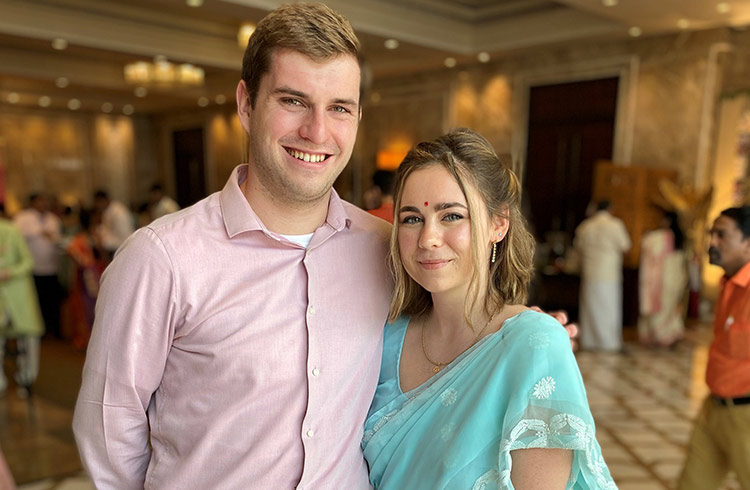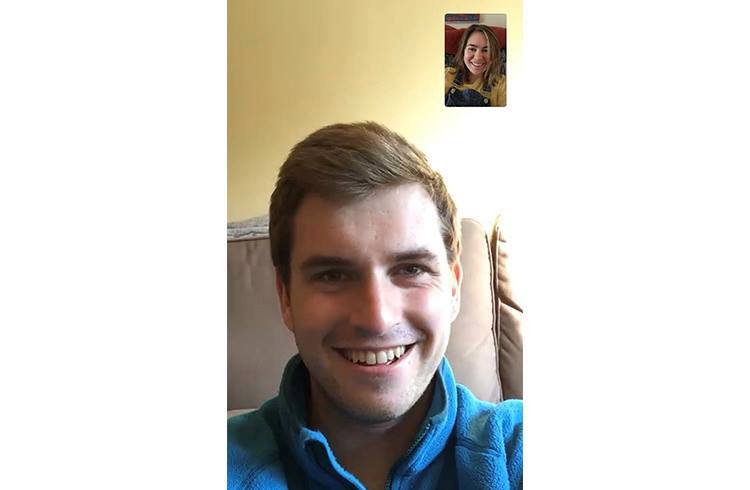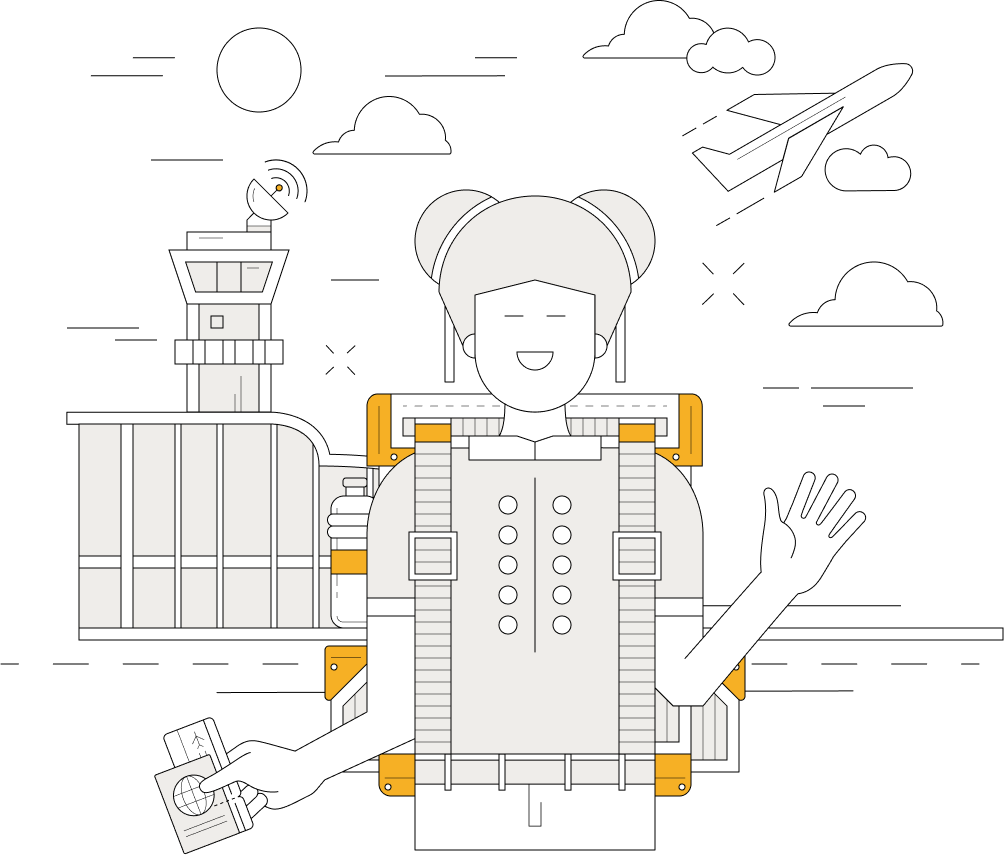In this episode, family, friends and partners separated by border closures, tips for keeping the spark alive, and the return of a relic from the 20th century.
Shares
 Photo © Sarah and Dan at a friend's wedding in Sri Lanka just a month before the pandemic
Photo © Sarah and Dan at a friend's wedding in Sri Lanka just a month before the pandemic
Listen Now
The World Nomads Podcast: COVID-19 Travel News
As governments around the globe impose lockdowns and people self-isolate, coronavirus (COVID-19) has hit the travel industry hard. The World Nomads Travel Podcast has suspended its regular destination episodes and, in their place, offering a round-up of the major coronavirus-related travel headlines, including the future of travel.
What’s in the episode
00:33 The return of a relic from the 20th Century
01:16 Masks are compulsory
02:32 Catching up with Sarah
04:36 Being in an international long-distance relationship
06:42 the blog post going gangbusters
07:41 In London and a long way from home
10:03 Thinking of the positives
10:55 Sticking with love
11:44 Next episode
Quotes from the episode
“It's not like we live an hour away from each other and we see each other on the weekends because when I lived in England, that's how it was. But this is... it's different. There's an ocean between us. It's an international long-distance relationship.” – Sarah
“I'm always feeling to a degree, a little bit homesick, but it's when you've got something so scary happening that you really realize how much you need your friends and your family back home.” - Ollie
Who is in the episode
Sarah Bence is a Michigan native who has spent time living in southwest England and traveling nomadically throughout the world. She holds a BA in Creative Writing and an MSc in Occupational Therapy. Combining these two passions, she loves to share the stories of misrepresented or disadvantaged communities and places. Sarah runs the travel blog Endless Distances about traveling with a chronic illness.

Ollie Geale is an Australian sports journalist with TalkSPORT and the producer and co-host of the podcast Two Sharp Reds. Ollie is on a two-year working visa in the UK and currently in lockdown in London.
Resources & links
Read Sarah’s long-distance date ideas and tips on how to make an international long-distance relationship work.
Horizon Unknown has released an article featuring 21 quarantine stories.
Coronavirus (COVID-19) and World Nomads Travel Insurance Coverage
In self-isolation? You can put your time to good use practicing your travel writing skills
You can get in touch with us by emailing podcast@worldnomads.com.
We use the Rodecaster Pro to record our episodes and interviews when in the studio, made possible with the kind support of Rode.
Kim: In this episode, family, friends, and partners separated by border closures, tips for keeping the spark alive, and the return of a relic from the 20th century.
Kim: Hi it’s Kim and Phil with you continuing to engage with the travel community by reflecting the way you are experiencing the virus. Kick it off with headlines though Phil.
Phil: The relic from the 20th century you mentioned is the drive-in, the outdoor movie theatres where you watch a movie with the sound connected from a box to your radio. They are making a comeback because it’s the perfect isolation activity! In their heyday, there were 4,000 drive-ins in the U.S. alone. But with cinemas now closed studios are looking at different ways of distributing their content alongside digital platforms like Netflix, hence the return of the drive-in.
Eurostar passengers are now required to wear face masks, and if you find they fog your glasses up, we’ve found an article on how to stop that happening – so no excuses not taking note of the restriction.
Lufthansa has also asked passengers to wear masks.
And Air Mauritius latest to enter voluntary administration
Kim: Horizon Unknown has released an article featuring 21 stories of travelers being stuck overseas as borders close around them when the pandemic hit, and we will share that in show notes.
Phil: We have been doing the same hence why we shelved our destination podcasts to focus on hearing from travelers and those in the travel industry affected by the virus – as there are so many stories to share. So, this episode is dedicated to all those in lockdown away from family and loved ones as we recognize the challenges you face.
Kim: Let’s starts with Sarah Bence, an American travel writer in a long-distance relationship. We last spoke to Sarah in our destination episode featuring France where she Sarah volunteered for a Refugee Women’s Centre in northern France – so what has she been up to since
Sarah: Yeah, so I'm living back in Michigan, which is where I'm originally from. Previously, I would have said I was a freelance travel writer, but obviously a lot of that kind of work has dried up. So I'm exploring other realms and other subjects and just trying to go with the flow the way I think a lot of people are right now.
I'm also a licensed occupational therapist, and one of the main reasons that I moved from England, where I was living previously, back to Michigan is so that I could transfer my license and become a licensed occupational therapist in the United States.
And I did that. It took a couple of years, but I did it and I just started a job in a pediatric therapy clinic right before this all happened. I got laid off from that job, unfortunately, back in March due to the pandemic and had to jump straight back into what I was doing before, which is freelance writing. I feel lucky that I had that to fall back on, but yeah, it's definitely been a wild time right now.
Sarah: But yeah, I guess the side effect that I was emailing you about moving back to the United States is that now I'm in an international long-distance relationship.
Kim: I like the international long-distance relationship.
Sarah: I always like to preface with that because I think it really... It's different. It's not like we live an hour away from each other and we see each other on the weekends because when I lived in England, that's how it was. But this is... It's really different. There's an ocean between us. It's an international long-distance relationship.
Sarah: But we have gotten used to it over the years and we've built up a tool kit of things that work for us and different ways to do virtual dates and things like that.
Kim: So this is not just because of COVID. This just adds another layer to that.
Sarah: Yeah. Definitely a complicated layer. We met when we were really young. We were only 20 when we met. We have career goals. [inaudible 00:02:09] wanted to finish his qualification to become a chartered accountant, so we made the decision together that we were both going to pursue those things individually. I think part of the thing is when you get in a relationship when you're so young, you can't... If you put your career goals and your individual goals to the side for another person, you might end up resenting them in the future.
Sarah: It's hard enough at the very beginning, but then if you add in the complications of the virus and not having any idea when you're going to be allowed into each other's countries again, that's stressful for us and we're kind of experts at this. I can't imagine how difficult it is for people who weren't planning on being a long-distance relationship.
Sarah: But yeah, I mean, I don't think there's any way to get around the fact that it was definitely tough, especially right now with everything that's going on with the pandemic is that so many people, whether it's with your partner or a friend or coworkers, you're just separated from everybody. You're learning how to Zoom with people and get comfortable calling people on the phone all the time to keep those relationships going and to get your social fix.
Kim: You could be writing articles on how couples can keep the spark alive.
Sarah: Yeah, I'm actually in the middle of that right now. In addition to freelance writing, I'm also a travel blogger and for a really long time, I didn't want to write about my relationship. I just wanted to keep personal things off of the blog. But I wrote an article about how to make a long-distance, international long-distance, relationship work. I think all travel bloggers can probably relate right now that we're trying not to look at Google analytics and trying to blissfully be ignorant of how much our page views and everything has been dropping.
Sarah: But I did look at my analytics a couple of weeks ago and my views have dropped by 80% but the post that is just blowing up right now that everybody's reading is this one about international long-distance relationships, which is kind of like... For me, it was like, "Oh yeah, basically everybody's in a long-distance relationship with everybody in their life that they don't live with right now."
Sarah: So I've actually been working on another article. I'm hoping to publish it in the next few days about different kinds of dates that you can do. I think I've got almost 30 dates in the article and I'm crowdsourcing. I'm obviously asking Dan, my boyfriend, and some other friends who've been in these kinds of international long-distance relationships for a while now.
Sarah: It'll be useful for people to be that kind of practical resource that people need right now.
Kim: So from an international long-distance relationship to international long-distance parenting. Ollie, my son, welcome to the World Nomads Travel Podcast.
Ollie: Well, it's about time you had me on, to be honest. I appreciate it.
Kim: So you're in London, you're a long way from home. What happened when you heard that this virus was a pandemic and borders were closing and you had choices to make? Take us through it.
Ollie: You certainly don't think that this is going to happen, but it was up there with one of my biggest fears in terms of making me want to come home, because I'm always feeling to a degree, a little bit homesick, but it's when you've got something so scary happening that you really realize how much you need your friends and your family back home. So that was always a big fear of mine. When the decision was made to essentially go right, here are your options, that became very real. I had a mate coming over from Adelaide. He was staying with me and he had to cut his trip short to make sure that he got back in time for the borders. I had mates that I'd met over here from Australia that had canceled their lease and packed everything up and moved back.
Ollie: I didn't even feel like I was in that position, but it was an overwhelming feeling of, London's technically my home at the moment. It was a pretty tough decision. I suppose the scariest bit was just knowing that for the next, who knows how long if I want to be able to see my friends and family and go back home, I might not be able to. And I think that's probably the more scary part. Whereas before, when there wasn't a pandemic, you kind of going into every day with a bit of ignorance really. You just go, "Yeah, if something happens I can just go home."
Or if I want to go home I can. But now it's actually quite scary.
Kim: Yeah. And you're also doing a job that many people would not find that rewarding right now and that's sports journalism.
Ollie: Yeah.
Kim: Given that this is not a lot of sport happening in the world.
Ollie: Yeah, well put it this way, I found a link to Taiwanese baseball that's still going on so you can still find some sport, but in terms of the working side, it's been tough. Or I'm lucky in the sense that I'm relatively entry-level so I've got lots of things I can so to take over. But if you're a well-established commentator or you strictly write about games or you're a statistician, things like that, it's pretty scary times where you just don't know when the next time is you going to be required.
Kim: We talk every day. How important is that contact with your family?
Ollie: Yeah, hugely important. And you know what, I always think about, well I try to think about the positives in most things. And you go, well what are the positives that you want to try and get out of this time? And one is I do feel slightly closer to all members of my family that are living in different cities across Australia. So it was always quite difficult to keep in touch with all the members of my family anyway. Now we're put in a situation where I guess we're encouraged to, and the Zoom chats, and it's the sort of thing that I hope will probably continue after all of this is finished, which is a pretty cool feeling. But no, it's hugely important.
Kim: Well, even if you were in Australia, we wouldn't be in the same state. We do different things, but I still love you as much if not more. No, that's not right, if not more. Wow. No, you can't go, you've either got love or you haven't got love.
Ollie: Yeah. No, I totally agree. I think we just stick with love.
Kim: And it would be remiss of me not to mention Ollie has his own podcast called Two Sharp Reds with international soccer star Mark Schwarzer, where they sip red wine, talk sport, and then compare the wine to a player.
Phil: If you are apart from your family or partner and want to share tips on keeping in touch email podcast@worldnomads.com .We will share Sarah’s article on long-distance relationships in show notes.
Kim: I wanted to share these two chats in this episode as it sets up our interview with Jane in the next episode well. While there has been a lot of talk about business and luxury travel bouncing back first post-COVID-19. Jane, who also runs a travel company which we will hear more about in that ep, says there are a ton of foreigners living and working overseas like Sarah and Ollie, some have holiday homes, some are studying and digital nomads working and she believes they are going to be the first people lining up at the airport. See you then.
Bye



No Comments